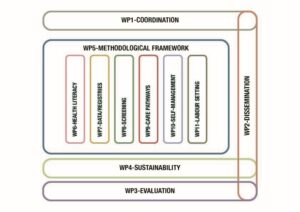The Joint Action on Cardiovascular Diseases and Diabetes (JACARDI) aims to reduce the burden of cardiovascular disease (CVD) and diabetes (DM) in EU countries, both at individual and population level.
The project aims to:
- build on what already exists;

- implement the unmet needs and priorities of Member States;
- cover the whole ‘patient pathway’; develop a methodological framework for context analysis, implementation of pilots and evaluation;
- develop a methodological framework for context analysis, pilot implementation and evaluation;
- define projects taking into account cross-cutting and intersectional aspects;
- adopt an equity, cultural and ethnic diversity perspective in the planned activities;
- develop a roadmap for scaling up; gender transformative leadership.
The activities are distributed in 11 work packages (WP): five cross-cutting, with an innovative WP on the development of a common methodological framework and an integrative approach, and six technical work packages.
In the framework of the project, 142 pilot projects will be implemented, ensuring a wide coverage and geographical extension of the project, following the guidelines set out in the common implementation and evaluation methodology in order to minimise the risks of failure and facilitate the analysis of success factors and context.
Have a roadmap of success stories with potential to disseminate and scale up experiences at regional and national level.
Enhance transnational collaboration, maximising the exploitation of lessons learned through a clear strategy, involving stakeholders, promoting integration and sustainability of approaches to achieve high-level impact, including the implementation of effective interaction, cooperation and co-creation between science and policy.
Biosistemak represents the Basque Country as an Affiliated Entity. It is the co-leading partner of work package 6 and leads and co-leads different tasks in work packages 2, 5, 6 and 9.
In addition, Biosistemak coordinates the activities being carried out to define two pilots at Basque Country level, in work package 6 on Health Literacy and work package 9 on the care route in heart failure specifically.
WP2: COMMUNICATION AND DISSEMINATION
Definition of the scientific publication and deployment strategy and plan, including the monitoring of the project’s scientific publications (publication of articles and participation in scientific events).
WP5: IMPLEMENTATION SCIENCE
Collaboration in the definition of the methodological framework for the design and implementation of 142 pilots in 21 EU countries bringing the experience of previous European projects such as CHRODIS+ and JADECARE.
WP6: HEALTH LITERACY
- Co-lead of the health literacy technical work package, including coordination of all tasks to be undertaken, coordination of the 24 pilots involved, development and management of the deliverables and milestones of the package.
- Leading the task of preparing the pilots participating in the package by conducting a situation analysis of their contexts and defining their health literacy needs.
- Co-lead the task of mapping and context analysis on health literacy in Member States.
- Organisation of training in the Ophelia methodology (WHO) for all partners involved in the package, in collaboration with the Centre for Global Health and Equity.
- Coordination of the piloting in Osakidetza to improve the health literacy of patients with cardiovascular diseases in order to improve their health, their knowledge of the disease and to promote the acquisition of new habits.
WP9: INTEGRATED CARE PATHWAYS
- Coordination and deployment of the task of mapping patient care needs and care pathways in cardiovascular diseases and diabetes, and identification of best practices at European level.
- Co-lead the task of defining the implementation plans of the 29 pilots participating in the package.
- Coordination of the Osakidetza pilot: “Definition and deployment of the Osakidetza value-based care pathway for heart failure.

